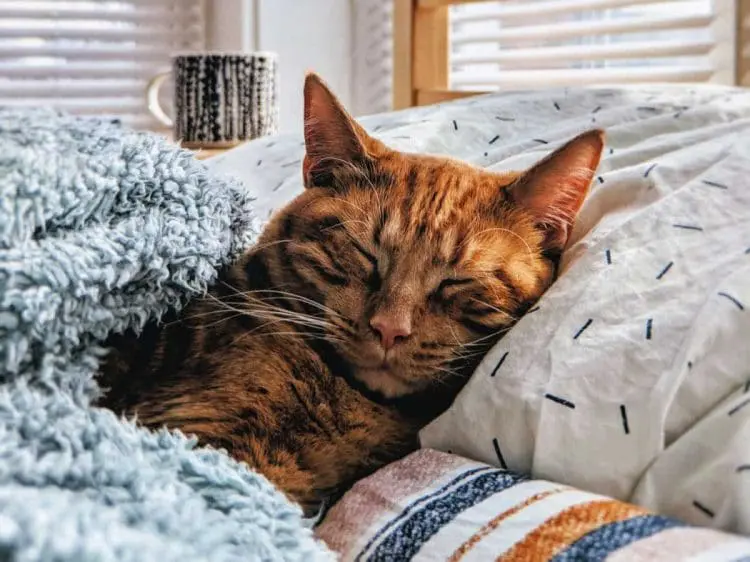Before you consider getting an adult cat or kitten, it’s important to think about the commitment involved and ensure that you’re ready for the particular animal you’ve chosen. After all, you are considering expanding your family! Here is what to know before getting a cat so you can make an informed decision about becoming a pet owner.
Thinking of bringing a furry friend into your home? Before you succumb to those adorable, pleading eyes and irresistible purrs, there are a few surprising revelations about cats that you should know. Prepare to be amazed as we uncover the fascinating world of our feline companions. From their enigmatic nocturnal antics to their mysterious communication methods, this article will expose eye-opening facts about cats that every future cat owner needs to be aware of. Buckle up for a thrilling ride as we delve into the mesmerizing universe of cats and discover the secrets that will ensure a seamless transition into feline companionship. So, get ready to unravel the mysteries of the whiskered wonders that are our beloved cats.

What To Know About Before You Adopt A Cat
You may have heard, cats are good for you! In fact, cats can provide unconditional love and immense satisfaction to their owners. However, responsible pet ownership requires that owners return that love. Although having a pet can be great fun, it is also immense work. I spend every day coaxing my cat to get off the table, cleaning up after the chinchilla, and hoping that my German shepherd will learn that the mailman is not her mortal enemy. But my work is paid back exponentially in love.
Cats are Crepuscular Creatures
One surprising aspect of a cat’s nature is their crepuscular behavior, which means they are most active during the twilight hours of dawn and dusk. This behavior stems from their evolutionary history as nocturnal hunters. In the wild, cats would hunt during these low-light periods to maximize their chances of catching prey.
As a result, if you decide to get a cat, be prepared for their surprising energy during these times. You may find your otherwise calm and collected companion suddenly zooming around the house or engaging in vigorous play sessions at the crack of dawn or as the sun sets. Providing outlets for their energy, such as interactive toys or playtime sessions, helps to ensure a harmonious coexistence.
Understanding their crepuscular behavior also sheds light on the importance of establishing a routine. Cats thrive on consistency and predictability, and having a set schedule can help them feel secure and content. Setting aside dedicated playtime and feeding times during these peak activity periods can help channel their energy, reducing the likelihood of them engaging in unwanted behaviors during the quieter hours of the day.
Cats are Independent but also Social
Cats are known for their independent nature, but they also have a strong social side. While they may not want on constant attention and interaction like some other pets, cats still crave companionship and enjoy being part of a family. They often like to be in charge of deciding when they want attention.
One way cats communicate their social desires is through physical affection. Many cats love to curl up on their owners’ laps or snuggle beside them in bed. These moments of closeness not only provide warmth and comfort but also strengthen the bond between cat and owner. It’s a special feeling to have a furry friend cozied up next to you, and it’s something that only those who have experienced it can truly understand.
Cats also rely on non-verbal cues to express their social needs. They may rub against your legs, headbutt you, or even lightly nibble on your fingers as a way of showing affection and marking you as part of their territory. These behaviors are signs that your cat trusts you and sees you as an important figure in their life. Beyond seeking physical contact, cats also enjoy being in the presence of their humans. They may choose to sit nearby while you work or watch TV, quietly observing your activities. This proximity provides them with a sense of companionship and security, knowing they are not alone.

Cats Communicate in Subtle Ways
Cats have their own unique ways of expressing themselves, using a diverse array of body language and vocalizations to convey their needs and emotions. Through carefully observed gestures and postures, they can communicate their intentions, whether it’s seeking affection, indicating playfulness, or showing signs of fear or unease. An arched back, raised tail, and erect fur can all signify heightened excitement or aggression, while a relaxed posture and slow eye blinking can indicate comfort and contentment.
Vocalizations also play a significant role in a cat’s communication repertoire. From the playful chirps and trills to the more assertive meows or hisses, cats vary their vocal range to express their desires and frustrations. Some cats may even develop unique vocalizations that become their signature way of communicating with their owners, adding an intriguing layer to their already mysterious persona.
Understanding these subtle communication cues can not only deepen the bond between humans and their feline companions but can also help address any potential issues or concerns. Recognizing when a cat is feeling anxious or threatened can prevent misunderstandings and promote a more harmonious living environment.
Cats are Natural Hunters
Cats possess an instinctual drive to hunt, a trait deeply ingrained in their DNA. Whether they are domesticated or still roam the wild, this inherent hunting behavior remains a fundamental part of their nature. To fully appreciate and understand cats, it is important to recognize and respect their innate hunting instincts. From the moment young kittens open their eyes and take their first wobbly steps, their predatory instincts start to develop. Playtime for young cats is not just for fun, but a crucial training ground for honing their hunting skills. Through stalking, pouncing, and chasing toys or other objects, kittens learn to perfect their agility, coordination, and strategic thinking.
Even well-fed domestic cats, who may never need to hunt for their survival, will still exhibit hunting behavior. This is not a reflection of neglect or dissatisfaction with their diet; it simply stems from their natural instinct. In a household environment, this instinct can be directed towards toys or games that simulate hunting, allowing cats to engage in their natural behavior in a safe and controlled manner. The predatory nature of cats is not limited to catching mice or birds. They can also show interest in insects, laser pointers, or even the elusive red dot from a laser pointer. This hunting behavior not only provides them with exercise and mental stimulation but also gives them a sense of fulfillment and satisfaction.
Cats are Clean Freaks
Cats are widely known for their impeccable grooming habits and desire for cleanliness. If you’ve ever owned a cat, you’ve probably witnessed them meticulously licking themselves, spending hours each day on grooming. This behavior not only helps them maintain their appearance but also serves important practical purposes.
By grooming themselves, cats remove dirt, debris, and loose hair from their coats, which minimizes the chances of skin irritations, infections, and other hygiene-related issues. In addition, their rough tongues act as natural brushes, aiding in the distribution of natural oils throughout their fur, which helps to keep it soft, shiny, and waterproof.
This obsession with cleanliness extends beyond their own bodies. Cats are known to be particular about their environment too, instinctively gravitating towards clean and tidy spaces. They have an innate need for a clean litter box, and failure to meet this expectation can result in litter tray aversion or inappropriate elimination. Understanding cats’ cleanliness preferences can help us provide them with the appropriate care they need.
Cats Need Mental and Physical Stimulation
Understanding the art of deciphering your cat’s health signals leads us to the realization that cats need mental and physical stimulation. Just like humans, cats can become bored or restless when their minds and bodies are not engaged. Without proper stimulation, cats may exhibit behavioral problems such as excessive scratching, aggression, or even depression. By providing your feline friend with activities that challenge their intellect and exercise their bodies, you can keep them happy and content.
One way to stimulate your cat’s mind is through interactive play. Cats are natural hunters, and engaging them in play that mimics hunting can provide mental stimulation. Consider using toys that require problem-solving, such as puzzle feeders or treat-dispensing toys. These toys encourage your cat to use their natural instincts to figure out how to access their rewards, keeping their minds sharp and engaged.
In addition to mental stimulation, cats also require physical exercise to stay healthy. Regular play sessions not only provide a great bonding opportunity between you and your cat but also help keep them physically fit. Interactive toys like feather wands or laser pointers can encourage your cat to chase and pounce, mimicking the movements they would make while hunting in the wild. Creating designated play areas with climbing structures, cat trees, or scratching posts can also give your cat the opportunity to stretch and exercise their muscles.
The Cost of a New Pet

The money you pay to purchase or adopt an animal is, in most cases, the smallest portion of the cost of owning a pet. From small expenses like greenies dog treats to more substantial expenses like veterinary bills and animal cages, you must ensure that you have the necessary funds to provide your animal with a good life. This includes paying for potential emergencies.
Generally speaking, the least expensive pets are small animals that require few toys and whose veterinary care is relatively inexpensive. Hamsters, gerbils and mice average $25 to $100 in setup costs and will typically require $100 to $200 a year in additional expenses.
Mammals such as chinchillas, guinea pigs, and ferrets require large cages and substantial toys that can cost several hundred dollars. However, annual veterinary and maintenance costs are minimal, ranging from $50 to $200.
Dogs and cats can be expensive pets, costing several hundred dollars in start-up costs including shots, de-worming, toys, and spaying or neutering. Depending on the animal’s size, their food is several hundred dollars each year, and training and veterinary costs are several hundred dollars more. You can always try to purchase items at a discount online, and buy in volume, like bulk puppy pads.
Time Commitment Your Pet Will Need
All pets require a minimal daily commitment of feeding and watering, so if you travel frequently, you’ll need to ensure you have a backup plan. However, reptiles can make excellent pets for busy families and people who travel frequently because they do not need attention and training. Small mammals and rodents enjoy frequent time spent out of their cage in a safe environment. Cats re pretty low maintenance. Cats are fairly independent and can be excellent choices for people who want the option of cuddling a pet without having to spend lots of time on walks and training. Dogs need daily exercise, playtime, and training and chew toys, but are great in returning your affection, and providing exercise for your kids.
Cats Live Longer Than You Might Expect
When it comes to the average lifespan of a cat, they often surpass our expectations. While the average lifespan of an indoor cat ranges from 13 to 17 years, many cats live well into their 20s with proper care. Some indoor cats may even live into their 30s! This means that when you bring a cat into your home, you could be embarking on a long-term commitment that spans decades.
Regular veterinary check-ups are also crucial for extending your cat’s lifespan. Routine examinations allow veterinarians to catch any potential health issues early on, ensuring prompt treatment and preventing the progression of diseases. Vaccinations, parasite prevention, and dental care are essential aspects of preventive healthcare that can significantly impact your cat’s longevity. Pet insurance may help with this.
Conclusion
Are you ready to be a pet parent? I hope that this information on what to know before getting a cat helps you be prepared for the commitment. Much like young children, pets take caring for, but it is so worth it! Getting a cat is an exciting and rewarding journey, but it’s good to first be aware of a few facts for a smooth transition. Cats are crepuscular creatures, meaning they are most active during twilight hours. They are independent yet social animals who enjoy the company of their human companions. It’s essential to understand their natural hunting instincts and provide mental and physical stimulation. Additionally, cats are expert clean freaks and have specific dietary requirements. Remember, cats live longer than you might expect, so be prepared for a long-lasting bond with your feline friend.
Despite the work involved in bringing a new animal into your life, the rewards can be immense. So go ahead, welcome a new cat into your home, and let the purrs of contentment fill your life. Make sure you’re prepared to return that love! I suggest rescue cats because all cats make great pets, not just an expense pedigree cat. Also, it doesn’t have to be a new kitty, even senior cats make wonderful companions!
Did you find these tips useful to consider before getting a pet? Any other pet tips you want to share?
The last photo in this post is an older cat up for adoption at my local humane society. Check with your local shelter or rescue organization to find the type of cat best for you.
Related Posts:
Eco Friendly Pet Care Tips & Products
How To Deal With The Loss Of A Pet
Cat Anxiety Treatment: Feliway For Cats
